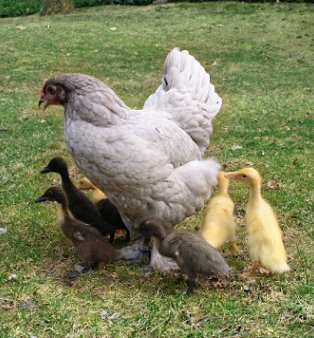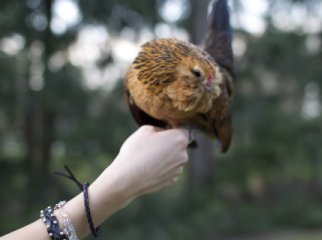
Ghost and Ducklings
Two years ago one of our blue Langshan hens, Ghost, went broody. She was huddled protectively on her nest, not allowing any of the other birds to even come near her. At that time our runners were laying like crazy, and there was a huge surplus of eggs that we weren’t even considering incubating. One day as I went about my morning chores I put two and two together. My coat pockets were filled with runner duck eggs, and I quickly placed a good dozen underneath the puffed up broody hen. After putting Ghost into a small corner cage in the main coop with her nest box, we settled down to wait. Every morning I went up to the coop and before doing anything else, lifted the mother hen carefully from her nest. Then I went about filling feeding trays and cleaning water basins as Ghost ran around getting some morning exercise and gorging herself on food. After about ten minutes she would dutifully return to her nest and settle in for a long day incubating her eggs. Finally, 28 days were up. I ran up my driveway from the bus, bursting with excitement. Dumping my backpack on the front yard, I sprinted straight to the main coop and slowed at the front of Ghost’s cage. I carefully tilted her up, enough to reach in and grab an egg. I held it to my ear and low and behold, I herd the telltale cheeping of a piping duckling. Upon listening to the other eggs, I found that about eight others were at the same stage! At this point I carried the whole nest box, mother hen and dozen eggs included, into my father’s shop where we had set up an enormous box to house our odd, feathered family. After adding water to the wood shavings to increase the humidity, I went in for the night. Early the next morning I ran outside, and to my great delight I discovered eight fuzzy, cheeping baby ducklings, huddled together under their clucking mother. As days passed, the ducklings became more and more independent of their feathered protector. They ventured farther into their cardboard world, exploring every reachable inch with their sensitive bills. However, at the slightest frightening noise or movement, they would all run for cover, and hold perfectly still under Ghost, who would cluck at them and let them know that everything would be okay. About a month of this passes in harmony , and one day I come inside to feed the ducklings and discover Ghost perched in the edge of the cardboard box, contentedly clucking away. Thinking nothing of it, I immediately picked her up and put her back inside her box with her ducklings. As soon as her feet touch the ground, all eight of the now six inch tall runner babies run over and begin to poke, prod, peck, nibble, and otherwise molest their mother. Ghost looks up, squats, and flies onto the edge of the box. Needless to say, I took the poor hen back up to the main run and let her loose. She looked relieved. After our first experience with a hen hatching duck eggs, we have continued the tradition. It continues to be satisfying, not only for us as we watch the antics of the ducklings with their mother, but also for the hen, as her instincts as a mother are finally satisfied. Clara Summer
Walking out of my father’s office, I hear the soft cluck of our contented Belgian D’anver hens, enjoying the warmth of the March afternoon. Halfway down the slight hill to our front door, I turn, hearing soft footsteps following me. As I turn I see a young D’anver hen, Summer, walking quickly after me. I stop where I am and watch as she approaches me with an eager gleam in her eyes. As she gets closer, she slows, eventually stopping on top of one of my converse clad feet. Bending over, she hops off and stands a few inches from my right foot. I slowly reach down and offer my hand for her. She eagerly jumps on board and sits contentedly on my hand as I raise her up to eye level. She cocks her head and looks at me for a second before suddenly losing interest and pecking at one of my silver rings. After a little bit of this, she stands, still on my hand, turns 360 degrees, looks at me once more with a sort of detached interest, before flapping away to the garden where she begins to scratch away at some very exciting leaves. My birds continue to amaze me with their antics and curiosity. They find their human keepers fascinating, and if they are brave or tame enough, will spend countless hours examining you, your clothes, and your shoes. Clara Reveries from Running Duck FarmIt's been roughly eight years since our daughter decided she needed to raise chickens. It started small with a nice group of egg layers. She incubates the eggs of carefully chosen breeding pairs, shows the hand raised birds at county fairs, sells birds, advises new flock owners and is trying to revive an extremely rare heritage breed. This naturally led to raising birds for meat, and now the flock is almost a full-time job and a huge part of our lives. It would have been easy for me to give up on gardening when our feathered friends first started taking over Running Duck Farm. Chickens and ducks are messy, stubborn, voracious and loud, but they have an equal number of qualities to recommend them. 
On this hot, late afternoon all the ducks are lounging on the grass in the shade of our big Rivers Beech. The English Calls and Indian Runners lie with their bills tucked under their wings enjoying group naptime. In a while one will decide naptime is over, wake up the others and they'll march single file into the pond--babies at the rear, wagging their little tails and quacking happily. Before we had ducks, I spent years cultivating a natural-looking water garden, with Pickerel Rush, various iris, grasses, Petasites, Primulas and one beautiful lotus a friend gave me to nurse back to health. "If anyone can grow this, you can," she said. Three years later, the most perfect lotus blossom I've ever seen greeted me one summer morning. The exquisite, pale yellow flower floated on crystal clear water, with schools of naturalized goldfish admiring it from below. I was ecstatic. Around that time the first ducks joined our flock. The lotus was never seen again. The fish went next, then the Yellow Flag! Ducks love sifting through the mud for bugs and bits of vegetation so the clear water was history as well. Not long ago I added a lead fountain of a running duck to spout water into my pond. It keeps the water clear, is a wonderful replacement for my long-lost flowers and adds the pleasant sound of splashing water to what is once more an idyllic scene. The best part is watching the ducks line up to take turns under its shower. 
Ducks love to eat bugs both in and out of the water, but chickens are a big help with this as well. An old stone trough under one of our spigots used to collect water all summer long. Mosquito larvae need standing water and thrive in decorative water features like troughs and birdbaths. This year I moved the trough to the front of the chicken coop next to an unusual pink Viburnum, in place of our usual plastic chicken waterers. It is much prettier and the hens are adorable as they perch on the trough's edge to drink. Not only do they jockey for position on the trough, but they practically fight over the immature mosquitos swimming below. Now when friends complain about the awful bugs that plague them all summer I just smile knowingly. 
Where the trough and Viburnum now reside there used to be a vibrant bed of tall wildflowers. The spot gets full sun all day and is quite frequently dry and dusty, which the flowers must have loved. Chickens bathe in dust, not water, and love nothing better than to dig a shallow hole in a nice flowerbed and hunker down in the sun. Then they flap around like fish out of water, making sure every feather is nicely dusted. Needless to say, after a short fight, I gave up on the flowers. They were replaced with four small, practically indestructible, globe boxwoods. Now the chickens dust-bathe to their hearts' content and everyone is happy. 
I will not, however, give up my nasturtiums. They grow up bamboo teepees near my herb garden, bloom like crazy and are easily picked for salads. Since they are next to the house, they are safe from marauding hens. Except Pigwidgeon. Pig was the first chicken we ever bought; she isn't necessarily at the top of the pecking order, but she believes her status gives her carte blanche with my favorite flowers. When she thinks I am looking the other way, she will quietly sneak away from the flock and slowly but surely make her way over to the nasturtiums. She is drawn to the Whirlybird mix, Empress of India, Strawberries and Cream and whatever other beauties are twining up the poles. Maybe it's the beautiful colors or the peppery taste she loves. Perhaps she is rebellious or does it for attention. I gently chase her away, hoping she will still be around to play the game next year. As a gardener, I'm especially grateful for what the "girls" leave behind. Chicken manure is the richest of all animal manures in nitrogen, potassium and potash. In our case, it's combined with bedding made of wood shavings. The mixture composts for one season and is ready for use the following spring. I spread it over my beds, plant directly into it, never worrying about free-ranging birds pecking about in beds fertilized with their own compost. We no longer use any chemicals on the property and, while we have a wicked crop of weeds in much of the lawn, the flower gardens are beautiful. My huge bed of pachysandra is beautiful too. Every spring I rake out the areas most matted with dead leaves, always taking special care with the front edge that shows the most. Early this spring I came home from work to a delightful surprise. Some kind soul had raked out the front edge of the entire curving bed and made a neat pile of the leaves, about six inches away. How nice! It took only seconds to locate the gardeners. A group of baby Cornish Crosses were madly raking the next bed of pachysandra as they foraged for good things to eat. I was charmed, grateful for their unexpected assistance and struck by how much I enjoyed them. We had progressed from half-hearted tolerance to true, harmonious interdependence. The animals belong in the gardens, and the gardens wouldn't be the same without them. By Nan Zander reprinted courtesy of Barbara Israel Garden Antiques - Focal Points
|


